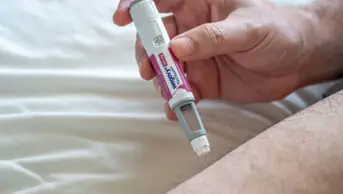
Shutterstock.com
In England’s first-ever men’s health strategy, launched on International Men’s Day on 19 November 2025, the government highlighted that men don’t access services, such as the NHS health check, as much as women do, saying it wants to learn from and scale up projects that help men access healthcare.
Read on for our picks of how community pharmacies can reach men who wouldn’t otherwise access healthcare, as well as our summary of clinical and research news from the week.
How can pharmacies reach men in their communities?
Many pharmacies already target underserved men in their communities, for instance by taking blood pressure checks to the pub, places of worship, and sports and community centres. Read on for more inspiration on what you could do in your community.
Further reading
The government also said it is working with the National Institute for Health and Care Excellence (NICE) to introduce approved health tech tools that men might be more willing to engage with than an in-person service. This includes apps to support men on weight-loss journeys and type 2 diabetes mellitus management, which men are disproportionately impacted by.
Further reading
NICE updates for sepsis and surgery
NICE has updated its sepsis guidance, splitting out information for those aged 16 years and over from guidance for children and those who are pregnant or have recently been pregnant. The new guidance for over 16s recommends using smaller amounts of intravenous fluid initially for those at risk of serious illness or death owing to sepsis, with patients reassessed after every infusion. Next, NICE plans to review the use of paediatric and maternity national early warning scores, which are used to spot when a patient’s condition is deteriorating.
NICE has also published draft guidance for consultation, which recommends broader use of tranexamic acid and suggests that it be offered to all adults having surgery in an operating theatre if there is a risk of bleeding and if the procedure will breach the skin or mucous membranes.
Further reading
Patient safety, polypharmacy and other guidance
Patient safety has been a major focus of our reporting this week, with patient safety commissioner Henrietta Hughes warning that barcode errors on medicines “pose critical patient safety risks” and could have “potentially fatal consequences”. Meanwhile, a coroner in Cheshire has raised concerns after a patient’s information was removed from software used to order repeat medication without notifying his GP.
New prescribing guidance from the British Geriatrics Society aims to balance the harms and benefits of medicines. It suggests that patients with hypertension and moderate frailty may benefit from a more lenient average systemic blood pressure target.
Meanwhile, a National Institute for Health and Care Research-funded study has found patients with eczema can bathe either daily or weekly, with no difference in eczema symptoms.
Further reading
Could AI help tackle AMR?
The Pharmaceutical Journal recently reported on the UK Health Security Agency’s (UKHSA’s) report on antimicrobial resistance (AMR), which for the first time in 2025 included data from England’s Pharmacy First scheme. During the first 11 months of the service — February to December 2024 — more than 1.2 million antimicrobial items were dispensed in total. However, overall, NHS antibiotic prescribing levels in primary care were lower in 2024 compared with 2019 pre-pandemic levels.
Internationally, research could help improve how and when antibiotics are prescribed. That’s one of six newly announced research programmes to be funded by GSK, which will include around 50 UK scientists using AI to speed up AMR research.
Further reading
- ‘Cocktail’ of medicines in waterways could pose new AMR threat
- Government ‘a long way off’ from meeting targets to control AMR infections
- How pharmacists can contribute to effective antimicrobial reviews
- MRSA: diagnosis, screening and management
- Urinary tract infection in adults: diagnosis, management and prevention
- Applications of AI in pharmacy practice
Cancer treatments to be made from recycled nuclear fuel
Finally, government-funded projects to make medicines manufacturing greener will include one that recycles nuclear fuel — that has already been used to power homes — into cancer therapies. The radionuclide called ‘lead-212’ will be used to create treatments called ‘targeted alpha therapies’, which target and destroy cancer cells “with minimal damage to healthy tissue and reduced side effects”, the UK National Nuclear Laboratory and Medicines Discovery Catapult said.
The UK has large reserves of lead-212, which means that the approach could be scaled up for cancer treatments for patients in the UK and worldwide, it added.


